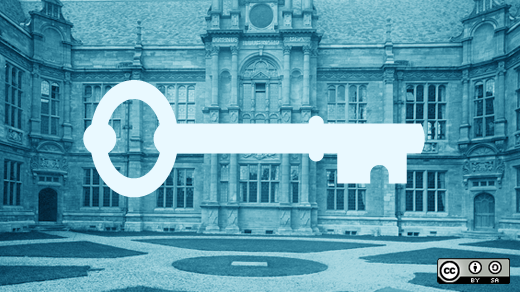I'd like to talk about what education is going to look like 20 years from now. I think, in 2030, our schools will mimic open source communities.
Look at any of the major open source projects: Fedora, Mozilla, even Python. Take a good look. Those are your CS departments, technical writing programs, software engineering, and IT departments of the future. In some places, those are the technical studies of today. Now imagine that extended to other disciplines. Art school. Film school. Veterinary school. The little hallway on the side where people study Classical Greek Poetry. What are those going to look like?
Let's start at the beginning of education: admissions. Despite having successfully applied to three schools by now (a magnet high school, college, and now my first PhD), I never did understand the admissions process. Schools ask you to prove your potential before they deem you worthy of access to their hallowed halls. Trouble is, I'm still not sure what makes solving algebra problems on the SAT a relevant predictor of your future as a dental professional, or what relation your grade in AP History has to your success as a lawyer. I've asked older industry colleagues, and guess what? They've never had a meeting where a customer walked in, asked if they had #2 pencils, then asked them to "prove the Pythagorean Theorem, and we'll give you the contract."
I'm told these scores and tests and things correlate to important stuff like intelligence and drive. But why give kids toy problems just to show intelligence and drive? You don't hire people to solve toy problems; you hire them to solve real ones. Maybe solving toy problems is an okay predictor of how well you can solve real ones. I'd argue that solving real problems is a way better predictor of how well you can solve real problems.
That's why I dove into open source; it feels good to make a difference somewhere other than a gradebook. And in open source communities, it's not assumed you can make a difference--it's expected that you will.
Open source communities believe that potential is only proven when it's used. In the open source world, you don't prove you could do something; you go do it, and the doing proves you've done it. The resources to learn and do the work are available to you before you even ask for them.
There's no admissions process for people, only for the work. It's an abundance mentality. What does it cost the community to let you try? The responsibility for your learning rests in your own hands; people can and often will help you, but they're not obligated to. The content and the code, and oftentimes the tools, are free; the time you're spending is your own.
When a resource is scarce and expensive, it makes sense to control access to it. You don't want to waste it. But data, information, and the tools for learning, experimenting, and exploring–those things are no longer scarce and expensive. We do not have to memorize oral traditions, or copy scrolls longhand, or even haul encyclopedias from town to town. We can, but we don't have to in order to access and transfer that information. A thumbdrive is a far better data transfer device than the human skull (does your brain support up to 127 hot-swappable devices at 480 megabits per second?) and I can write a Python script that queries semantic databases faster than I can recall the lists of lists in Wikipedia. The information revolution happened--or at least the technology part did. Now we're scrambling to get our thinking and teaching—our processes--to catch up.
Teachers are no longer a bottleneck, the sole providers of information. This doesn't make them obsolete--it makes them far more important as the guides who'll help us make sense of the wealth of data that's available to us. Now that schools and libraries aren't the only places you can find high-quality learning materials, they change from gathering-places for information to gathering places for learners.
But learning can—and does—happen outside the teacher-student relationship. It always did, but not at the speed, or depth, or breadth of today. And why would we even want to say who can and can't learn something? If tools and knowledge are open and freely accessible, like in open source communities, it doesn't cost us anything to let them try. It's an abundance mentality. When you stop worrying about running out of resources, you can actually start caring about people.
And you know what? Some people will fail. I hope they fail. That's how you learn. The vast expanse of information people are exposed to today is rife with wrongness, bad science, and blindingly incorrect facts. And that's ok. It teaches us to be good critics, to evaluate the data we get, and determine whether it is reasonable or not. To verify our sources. This is a critical skill in the information age.
And the thing is, open source communities have found ways to let people fail over and over again. To allow mistakes to be made. They learn together from these errors—even repeated ones--and when they do succeed, the effort is stronger for the mistakes that have been addressed. I'd like to see more schools and companies allow more people of all sorts to do the same.







7 Comments